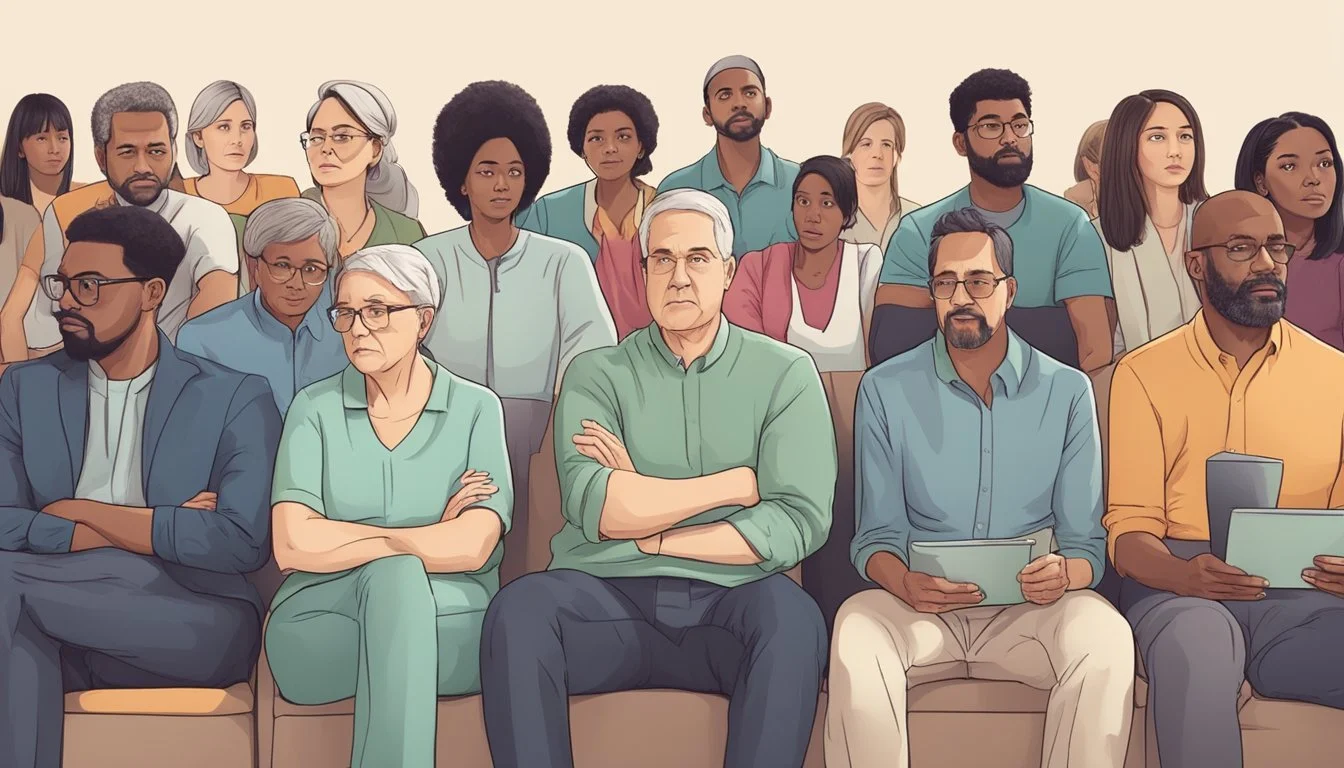Shocking Food Industry Secrets Exposed: The Documentary That's Changing Diets
Health documentaries have gained popularity in recent years, shedding light on various aspects of nutrition, disease prevention, and the food industry. One notable example is "What the Health," released in 2017 and directed by Kip Andersen and Keegan Kuhn. This film explores connections between diet and chronic diseases, examining the influence of major health organizations and food industries on public health recommendations.
"What the Health" presents controversial claims about the impact of animal products on human health and advocates for a plant-based diet as a solution to many health issues. The documentary features interviews with medical professionals and examines scientific studies to support its arguments. It also raises questions about potential conflicts of interest within health organizations and their relationships with food industry sponsors.
While "What the Health" has sparked debates among viewers and health professionals, it exemplifies how documentaries can stimulate discussions about nutrition, health policies, and the role of various industries in shaping public health guidelines. As with any health-related media, viewers are encouraged to approach such documentaries critically and consult diverse sources for a comprehensive understanding of the topics presented.
Understanding Health Documentaries
Health documentaries explore medical issues, nutrition, wellness trends, and healthcare systems. They aim to inform and inspire viewers to take control of their well-being through expert interviews, personal stories, and scientific evidence.
Defining the Genre
Health documentaries are non-fiction films that focus on medical, nutritional, or wellness topics. They often combine expert interviews, scientific data, and personal narratives to educate viewers about health issues. These films can cover a wide range of subjects, from chronic diseases to diet trends and mental health.
Filmmakers use various storytelling techniques to engage audiences and convey complex information. Visual aids, animations, and reenactments help explain medical concepts. Personal stories humanize the issues and create emotional connections with viewers.
Historical Evolution
Health documentaries have evolved significantly since their inception. Early films primarily focused on public health campaigns and medical breakthroughs. As technology advanced, documentaries became more accessible and diverse in their topics.
In recent years, streaming platforms have popularized health documentaries. This increased accessibility has led to a broader range of subjects being covered. Modern health documentaries often tackle controversial topics like alternative medicine, food industry practices, and healthcare system flaws.
The rise of social media has also influenced the genre. Many health documentaries now incorporate interactive elements and online communities to extend their impact beyond the screen.
Role of Filmmaker and Activists
Filmmakers and activists play crucial roles in shaping health documentaries. They often collaborate to bring important issues to light and inspire change. Filmmakers use their storytelling skills to present complex health topics in an engaging and understandable way.
Activists contribute by providing expertise, personal experiences, and connections to affected communities. They help ensure that documentaries accurately represent the issues and propose actionable solutions.
The partnership between filmmakers and activists can lead to powerful narratives that educate viewers and motivate them to take action. This collaboration often extends beyond the film, with many documentaries accompanied by outreach campaigns and educational resources.
Key Health Documentary Films
Health documentaries expose hidden truths about nutrition, the food industry, and wellness. These films challenge conventional wisdom and inspire viewers to make informed choices about their diet and lifestyle.
What the Health
"What the Health" investigates the links between diet and disease. The film examines the influence of pharmaceutical and food industries on health policies. It features interviews with medical experts and showcases plant-based success stories.
The documentary highlights potential health risks associated with consuming animal products. It argues that many chronic diseases can be prevented or reversed through dietary changes.
Critics praise the film's eye-opening revelations. Some experts, however, debate certain claims made in the documentary. Despite controversy, "What the Health" remains a thought-provoking exploration of nutrition's impact on health.
Forks Over Knives
"Forks Over Knives" advocates for a whole-food, plant-based diet. The film follows several patients who adopt this eating style under medical supervision. It presents research suggesting that many degenerative diseases can be controlled through dietary choices.
The documentary features the work of Dr. T. Colin Campbell and Dr. Caldwell Esselstyn. Their studies indicate that eliminating processed foods and animal products can lead to significant health improvements.
"Forks Over Knives" showcases personal transformation stories. It offers practical advice for transitioning to a plant-based diet. The film has inspired many viewers to reassess their eating habits and explore vegan options.
The Game Changers
"The Game Changers" focuses on the benefits of plant-based diets for athletes. It challenges the belief that meat is necessary for optimal physical performance. The documentary follows James Wilks, a former UFC fighter, as he explores the science behind plant-based nutrition.
The film features elite athletes who thrive on vegan diets. It presents scientific evidence supporting the advantages of plant-based eating for strength, endurance, and recovery.
"The Game Changers" addresses common concerns about protein intake and muscle building. It showcases the environmental and ethical benefits of plant-based diets. The documentary has sparked discussions in the sports and fitness communities.
That Sugar Film
"That Sugar Film" exposes the hidden sugar in many seemingly healthy foods. Director Damon Gameau conducts a personal experiment, consuming 40 teaspoons of sugar daily from "healthy" foods. The film reveals the impact of this diet on his body and mind.
The documentary explores sugar's addictive properties and its prevalence in processed foods. It examines the food industry's tactics to promote sugar-laden products. "That Sugar Film" also investigates the global rise in sugar consumption and its health consequences.
Gameau visits various locations to understand cultural perspectives on sugar. The film offers practical tips for reducing sugar intake. It emphasizes reading food labels and making informed choices.
Food, Inc.
"Food, Inc." provides a critical look at corporate farming in America. The film exposes the unseen workings of the food industry and its impact on health, worker rights, and the environment. It features interviews with farmers, industry insiders, and food safety advocates.
The documentary examines the industrialization of meat and grain production. It highlights the widespread use of genetically modified organisms (GMOs) in agriculture. "Food, Inc." also explores the economic and political factors influencing food policies.
The film encourages viewers to support local, sustainable farming practices. It offers suggestions for making healthier food choices and advocating for transparency in the food industry.
Fed Up
"Fed Up" tackles the obesity epidemic, focusing on the role of sugar in the American diet. The documentary argues that the "calories in, calories out" model of weight management is flawed. It explores how the food industry and government policies contribute to the problem.
The film features personal stories of children struggling with obesity. It presents expert opinions on the addictive nature of sugar and its impact on metabolism. "Fed Up" challenges the effectiveness of exercise-focused approaches to weight loss.
The documentary examines food marketing tactics targeting children. It criticizes the influence of food industry lobbying on dietary guidelines. "Fed Up" encourages viewers to reduce sugar intake and advocate for policy changes.
Impact on Public Perception and Behavior
Health documentaries have the power to shape viewers' understanding of wellness and inspire tangible changes in their daily lives. These films often highlight crucial health issues and offer actionable solutions.
Dietary Changes
Many health documentaries focus on nutrition and its impact on overall wellbeing. Films exploring plant-based diets have led some viewers to reduce or eliminate meat consumption. These documentaries often expose practices within the food industry, prompting audiences to reconsider their food choices.
Some viewers report switching to organic produce or cutting out processed foods after watching health films. Documentaries highlighting the benefits of whole foods have inspired people to cook more meals at home using fresh ingredients.
Lifestyle and Environmental Awareness
Health documentaries frequently address the connection between personal habits and environmental health. Films exploring climate change have motivated viewers to adopt more sustainable practices. Some people report reducing their carbon footprint by cycling or using public transport after watching these documentaries.
Documentaries on stress and mental health have led viewers to incorporate meditation or yoga into their routines. Films about sleep hygiene have inspired changes in bedtime habits and technology use. Some viewers have taken up new hobbies or outdoor activities after watching documentaries on the benefits of nature exposure and physical activity.
Critiques and Controversies
The documentary "What the Health" sparked significant debate upon its release. It faced scrutiny for its scientific claims, provocative approach, and potential impact on healthcare perceptions.
Scientific Accuracy
Critics questioned the film's scientific rigor. Nutrition experts pointed out selective use of research to support its vegan message. The documentary's claims about links between animal products and diseases were criticized as oversimplified or exaggerated.
Some health professionals argued that the film misrepresented complex nutritional science. They noted that while plant-based diets can be healthy, the film's portrayal of all animal products as harmful lacked nuance.
Fact-checkers found issues with several statistics presented in the documentary. This raised concerns about the overall reliability of the information provided to viewers.
Provocative Nature
"What the Health" employed provocative tactics to convey its message. The film used dramatic imagery and emotional appeals, which some viewed as manipulative.
Its confrontational approach towards health organizations and the food industry drew both praise and criticism. Supporters saw it as bold truth-telling, while detractors labeled it as sensationalism.
The documentary's stark portrayal of dietary choices as either harmful or beneficial was seen by some as overly simplistic. This black-and-white presentation of nutrition science sparked debate among viewers and experts alike.
Effect on Healthcare Industry
The film's portrayal of the healthcare and pharmaceutical industries was particularly controversial. It suggested these sectors prioritized profits over public health, a claim that industry representatives strongly disputed.
Some praised the documentary for challenging the status quo in healthcare. Others worried it might discourage people from seeking necessary medical treatments or following established dietary guidelines.
The film's criticism of health organizations' funding sources raised questions about potential conflicts of interest in nutrition research and policy-making. This aspect of the documentary prompted discussions about transparency in healthcare recommendations.
Connections to Global Health Issues
Health documentaries explore critical global health challenges, highlighting their far-reaching impacts and interconnections. These films shed light on pressing issues affecting populations worldwide, from chronic diseases to mental health concerns and infectious outbreaks.
Chronic Diseases
Diabetes, cancer, heart disease, and obesity are major focuses of health documentaries. These films examine the rising prevalence of chronic conditions globally, exploring their causes and consequences. Documentaries often highlight:
• Lifestyle factors contributing to chronic diseases • Economic burdens on healthcare systems • Disparities in access to treatment and care
Many films emphasize prevention strategies and showcase innovative approaches to managing chronic illnesses. They also explore the roles of diet, exercise, and environmental factors in disease development and progression.
Mental Health and Society
Mental health documentaries address the growing global burden of anxiety, depression, and other psychological disorders. Key themes include:
• Stigma surrounding mental illness • Inadequate healthcare resources for mental health treatment • Impact of societal pressures on psychological well-being
These films often feature personal stories to illustrate the challenges faced by individuals living with mental health conditions. They also examine cultural differences in perceptions and treatment of mental illness across various countries and communities.
Opioid Crisis and Addiction
Documentaries on the opioid epidemic reveal the devastating impact of addiction on individuals, families, and communities. These films typically cover:
• Origins of the opioid crisis • Role of pharmaceutical companies and healthcare providers • Struggles of addiction and recovery
Many documentaries explore innovative treatment approaches and policy solutions to combat the opioid crisis. They often highlight the need for comprehensive strategies involving healthcare, law enforcement, and social services to address this complex issue.
Diseases and Pandemics
Health documentaries frequently examine the spread and impact of infectious diseases, including recent pandemics. These films explore:
• Emergence of new pathogens • Global response efforts to contain outbreaks • Socioeconomic consequences of widespread illness
Documentaries often analyze historical pandemics to draw lessons for future preparedness. They highlight the importance of international cooperation, scientific research, and public health measures in combating global health threats.
In-Depth Film Analysis
Health documentaries employ various filmmaking techniques to inform and engage viewers. These elements work together to present complex medical information in an accessible and compelling manner.
The Power of Narration
Narration guides viewers through the documentary's key points. Clear, authoritative voiceovers explain medical concepts and research findings. Narrators often use analogies to make complex health topics relatable. Some films feature celebrity narrators to add credibility and draw in audiences.
Personal anecdotes from the narrator can humanize the subject matter. This helps viewers connect emotionally with the health issues presented.
Cinematography Techniques
Health documentaries use visual storytelling to enhance their messages. Close-up shots of medical procedures or cellular activity bring microscopic processes to life. Time-lapse photography shows long-term health effects in condensed timeframes.
Graphics and animations illustrate complex bodily functions or statistical data. These visuals break down abstract concepts into digestible formats.
Filmmakers also use lighting and color grading to set mood and emphasize key points. Bright, hopeful tones often accompany sections on treatment breakthroughs.
Use of Expert Interviews
Interviews with medical professionals lend credibility to health documentaries. Doctors, researchers, and nutritionists explain scientific concepts in layman's terms. These experts often present contrasting viewpoints to give a balanced perspective on controversial health topics.
Filmmakers may film interviews in clinical settings to reinforce the experts' credentials. B-roll footage of the interviewees at work adds visual interest and context to their statements.
Case Studies and Personal Stories
Real-life examples make abstract health concepts concrete and relatable. Documentaries often follow individuals dealing with specific health conditions. These personal journeys show the human impact of diseases and treatments.
Before-and-after comparisons demonstrate the effects of lifestyle changes or medical interventions. Patient testimonials can be powerful motivators for viewers to take action regarding their own health.
Ethical documentarians obtain informed consent and protect the privacy of featured individuals.
The Role of Streaming Platforms
Streaming platforms have revolutionized how people access health documentaries. Netflix, in particular, has emerged as a major player in distributing these informative films.
The platform's global reach allows health documentaries to find audiences far beyond traditional distribution channels. This increased accessibility has sparked wider conversations about important health topics.
Netflix invests in producing original health documentaries, often tackling controversial or underexplored subjects. These films can influence public opinion and raise awareness of various health issues.
The streaming format encourages binge-watching, allowing viewers to immerse themselves in health topics for extended periods. This can lead to deeper engagement and understanding of complex health concepts.
Streaming platforms' recommendation algorithms often suggest related health documentaries, creating a pathway for viewers to explore multiple perspectives on a topic. This can promote a more comprehensive understanding of health issues.
The on-demand nature of streaming services allows viewers to watch health documentaries at their own pace, pausing to research or discuss content with others. This flexibility enhances the educational value of these films.
By featuring health documentaries prominently, streaming platforms legitimize these films as valuable content. This recognition can encourage more filmmakers to create high-quality health documentaries.
Educational and Advocacy Initiatives
Health documentaries play a crucial role in raising awareness and promoting positive change. They collaborate with organizations and target young audiences to maximize their impact.
Partnerships with Health Organizations
Health documentaries often team up with reputable health organizations to amplify their message. These partnerships provide credibility and resources for wider distribution. Filmmakers work closely with experts to ensure accurate information is presented. Organizations may offer funding, research support, or promotional assistance.
Many documentaries feature interviews with representatives from health organizations. This gives viewers direct access to authoritative voices in the field. Some partnerships result in screening events or panel discussions after film showings.
Outreach to Schools and Children
Documentaries targeting children use age-appropriate content to educate on health topics. Schools incorporate these films into their curriculum to supplement health education. Interactive elements, such as quizzes or activities, often accompany the screenings.
Filmmakers create shorter versions or episodic content suitable for classroom use. Some documentaries offer free educational materials for teachers. These resources help extend the learning beyond the viewing experience.
Child-focused health documentaries often use animation or relatable young hosts. This approach makes complex health topics more accessible and engaging for young viewers.
The Future of Health Documentaries
Health documentaries are poised to evolve rapidly in the coming years. New topics, technologies, and societal impacts will reshape how these films inform and engage audiences about critical health issues.
Emerging Topics
Climate change's health impacts will likely feature prominently in future documentaries. Films may explore rising heat-related illnesses, changing disease patterns, and food security challenges. The pharmaceutical industry's role in addressing global health crises could be scrutinized more closely.
Documentaries may increasingly focus on the intersection of technology and healthcare, examining telemedicine, AI diagnostics, and personalized medicine. Mental health and its connections to social media use and screen time will likely gain more attention.
The food industry's influence on public health may be explored further, with films investigating ultra-processed foods, sustainable agriculture, and nutrition policy.
Technological Advancements
Virtual and augmented reality could transform how health documentaries are experienced. Viewers may be able to take immersive journeys through the human body or witness medical procedures firsthand.
Interactive elements may allow audiences to explore health data in real-time or participate in simulated health scenarios. 3D animations and data visualizations could make complex medical concepts more accessible to general audiences.
Documentaries may leverage artificial intelligence to analyze vast amounts of health data, uncovering new insights and trends. Blockchain technology could be used to verify the authenticity of medical information presented in films.
Potential for Social Change
Future health documentaries may increasingly focus on actionable steps viewers can take to improve their health and communities. Films could spark grassroots health initiatives or influence policy decisions.
Social media integration may allow viewers to connect with experts, share experiences, and join health-related movements in real-time. Documentaries might partner with healthcare providers to offer screenings or resources tied to the film's content.
Global health inequities could be spotlighted more, with documentaries fostering cross-cultural understanding and support for underserved populations. Films may play a crucial role in combating health misinformation by providing evidence-based, engaging content.







